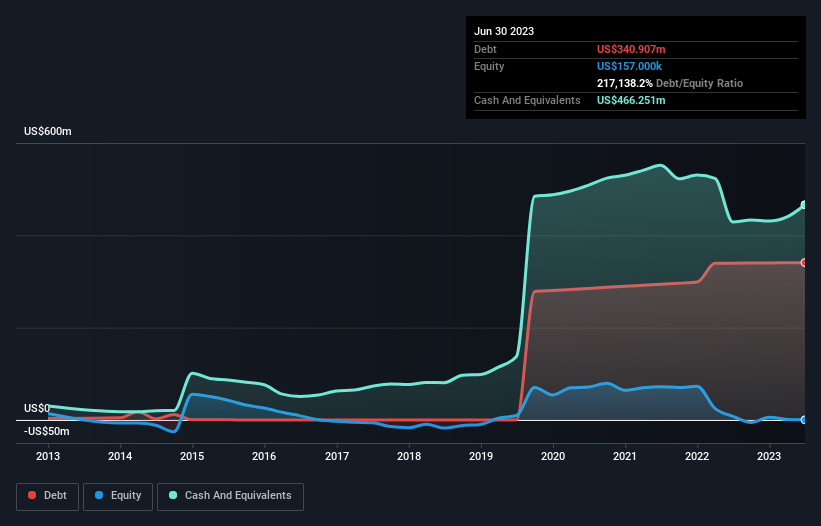Some say volatility, rather than debt, is the best way to think about risk as an investor, but Warren Buffett famously said that 'Volatility is far from synonymous with risk.' It's only natural to consider a company's balance sheet when you examine how risky it is, since debt is often involved when a business collapses. As with many other companies Workiva Inc. (NYSE:WK) makes use of debt. But the real question is whether this debt is making the company risky.
What Risk Does Debt Bring?
Generally speaking, debt only becomes a real problem when a company can't easily pay it off, either by raising capital or with its own cash flow. If things get really bad, the lenders can take control of the business. However, a more frequent (but still costly) occurrence is where a company must issue shares at bargain-basement prices, permanently diluting shareholders, just to shore up its balance sheet. Of course, plenty of companies use debt to fund growth, without any negative consequences. The first thing to do when considering how much debt a business uses is to look at its cash and debt together.
See our latest analysis for Workiva
What Is Workiva's Net Debt?
The chart below, which you can click on for greater detail, shows that Workiva had US$340.9m in debt in June 2023; about the same as the year before. However, its balance sheet shows it holds US$466.3m in cash, so it actually has US$125.3m net cash.

A Look At Workiva's Liabilities
The latest balance sheet data shows that Workiva had liabilities of US$424.3m due within a year, and liabilities of US$406.3m falling due after that. On the other hand, it had cash of US$466.3m and US$89.7m worth of receivables due within a year. So its liabilities total US$274.6m more than the combination of its cash and short-term receivables.
Since publicly traded Workiva shares are worth a total of US$5.99b, it seems unlikely that this level of liabilities would be a major threat. But there are sufficient liabilities that we would certainly recommend shareholders continue to monitor the balance sheet, going forward. Despite its noteworthy liabilities, Workiva boasts net cash, so it's fair to say it does not have a heavy debt load! The balance sheet is clearly the area to focus on when you are analysing debt. But ultimately the future profitability of the business will decide if Workiva can strengthen its balance sheet over time. So if you want to see what the professionals think, you might find this free report on analyst profit forecasts to be interesting.
In the last year Workiva wasn't profitable at an EBIT level, but managed to grow its revenue by 18%, to US$582m. We usually like to see faster growth from unprofitable companies, but each to their own.
So How Risky Is Workiva?
While Workiva lost money on an earnings before interest and tax (EBIT) level, it actually generated positive free cash flow US$32m. So taking that on face value, and considering the net cash situation, we don't think that the stock is too risky in the near term. Until we see some positive EBIT, we're a bit cautious of the stock, not least because of the rather modest revenue growth. There's no doubt that we learn most about debt from the balance sheet. However, not all investment risk resides within the balance sheet - far from it. These risks can be hard to spot. Every company has them, and we've spotted 2 warning signs for Workiva you should know about.
When all is said and done, sometimes its easier to focus on companies that don't even need debt. Readers can access a list of growth stocks with zero net debt 100% free, right now.
Valuation is complex, but we're here to simplify it.
Discover if Workiva might be undervalued or overvalued with our detailed analysis, featuring fair value estimates, potential risks, dividends, insider trades, and its financial condition.
Access Free AnalysisHave feedback on this article? Concerned about the content? Get in touch with us directly. Alternatively, email editorial-team (at) simplywallst.com.
This article by Simply Wall St is general in nature. We provide commentary based on historical data and analyst forecasts only using an unbiased methodology and our articles are not intended to be financial advice. It does not constitute a recommendation to buy or sell any stock, and does not take account of your objectives, or your financial situation. We aim to bring you long-term focused analysis driven by fundamental data. Note that our analysis may not factor in the latest price-sensitive company announcements or qualitative material. Simply Wall St has no position in any stocks mentioned.
About NYSE:WK
Workiva
Provides cloud-based reporting solutions in the Americas and internationally.
High growth potential and good value.
Similar Companies
Market Insights
Community Narratives





